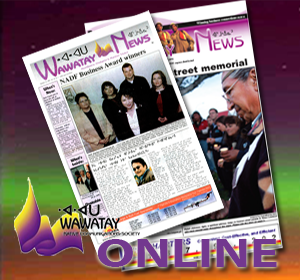Neskantaga’s Luke Sagutch is encouraging people to “face the fear” and get counselling for their residential school issues.
“Face the fear, acknowledge that fear, where is it coming from,” said the resolution support worker with Nishnawbe Aski Nation. “Once you recognize that fear, you can deal with that fear.”
Sagutch said it is easy to deal with bigger issues that are visible but not so easy to deal with smaller issues that are hidden.
“They are very hideous, they are hidden,” Sagutch said. “They are lurking around like a mouse lurking around wanting to eat something.”
Sagutch was instrumental in developing the NAN Residential School curriculum launched in September. The program is designed to educate youth on the history and impact of residential school.
Sagutch said he didn’t understand his own hidden issues when he was younger and had fear within himself.
“I didn’t want to deal with anything,” Sagutch said. “I literally ran away from one place and went to go live somewhere else, to develop another relationship, or to change jobs. I moved from job to job for many years because of that.”
Sagutch began changing his life around after realizing in the 1990s that he had been abused while in residential school. He said the abuse led to a relationship breakup with his family as well as alcohol abuse.
“I started getting some counselling, little by little, started dealing with it, little by little,” Sagutch said. “That’s when I decided I was going to do something about it, not so much rebuilding my relationship with my family but rebuilding my own relationship within myself. That was where the key was, not having a relationship with me, because I kept running away from me.”
Sagutch said the rebuilding of his relationship within himself was the most powerful and humiliating experience he has ever put himself through.
“I went to treatment, I went to counselling, I saw therapists, I saw Elders, traditional healers,” Sagutch said. “I got into the spirituality, not just Native spirituality, but spirituality in general.”
Sagutch feels “free spirited” after undergoing his healing process.
“I can travel, I can work with anybody, I can listen to anybody, I can relate with anybody — it doesn’t matter who it is, it could be a male or a female, Native or a non-Native,” Sagutch said. “I see no colour today, I see human beings. That’s what I see.”
Sagutch said his family had lived a peaceful nomadic life on the land before he was sent away to residential school.
“We had a very peaceful, loving family,” Sagutch said. “We enjoyed all the peace and serenity of the bush life.”
Sagutch remembers waking up to birds singing, loons crying and mists rising off the water before he was sent to residential school.
“Living on the land was great,” Sagutch said. “I was glad that I did experience the tail end of that nomadic lifestyle, even though it was quite short.”
Sagutch enjoyed connecting with the land and the resources on the land.
“My cousins and I, we used to find ways to amuse ourselves,” Sagutch said. “We were very creative and we did a lot of things. We were never bored.”
Sagutch still reminisces about growing up on the land with one of the friends he grew up on the land.
“We were never bored even though we never had anything like the kids have today,” Sagutch said. “We made our own, that’s the amazing part about it.”
Sagutch said his family moved around to different locations in the Attawapiskat Lake and Attawapiskat River area according to the time of the year, travelling by canoe and living in log cabins and prospector tent camps.
“Things changed in my life (when we moved) to a community called Lansdowne House,” Sagutch said, noting he met different children, did different activities and learned a different language. “And my parents were also advised that their kids had to go to school.”
Sagutch said his family was given 72 hours notice that he and his sister had to go to residential school.
It looks like the swallows are back and that is a sure sign of spring and warmer weather to come.












It looks like the swallows are back and that is a sure sign of spring and warmer weather to come. A couple of weeks ago I heard the honking of Niska (Canada...
If you pause to think about it, there are special people in our lives that we always assumed would always be around no matter where our life journey takes...